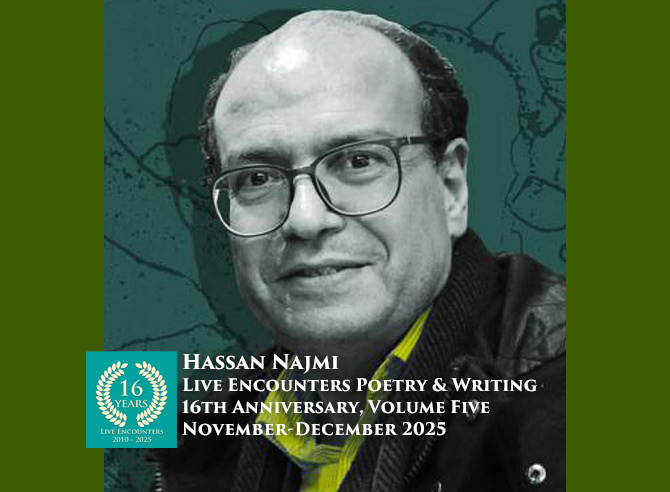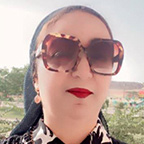
Live Encounters Arab Poetry & Writing 16th Anniversary Volume Five
November- December 2025
Cupid, poems by Hassan Najmi.
Translated from Arabic by Dr. Salwa Gouda.
Cupid
Her child is asleep now – and she is rocking him. Her voice is pure as she recites, for him, rhymes and songs. She lets her braid fall over the lilies of his face. And she voices no complaint to the universe.
Her child is asleep in her arms now – and she is staring at his small statue, and at his quiver of arrows that never empties. The stars look down upon the marble of lamentation. The bracelets, the earrings, and the allure tremble. The princesses have emptied their baskets of fruit. They have crowned themselves and sat down exchanging lips and birdsong. The house is scented with perfumes and incense, sprinkled with rosewater. They lit the candles a short while ago. And she does not know why all these faces around her are looking for. She does not know from where the winged angels came to his bedside.
Her child is asleep now – and she still breathes in the fragrance that has turned bittersweet in his neck.
She insists that he is alive, even though he was buried twenty centuries, a dozen years, six months, and three nights ago. Most likely, she did not see them close his eyes. And she still covers his drowsiness with kisses. And because she knows that Death has the ambition of a scoundrel – she screams at them, don’t wake him!
The Mailman
I knew that death would come
But I did not expect it to be carried on the wind of this morning
Don’t tell me you knew he would die!
There was no smile on his face of one prepared
His glasses were in their place, near his gaze
There was a light rain
A few drops had wet the windowpane
He had not yet finished reading a novel whose first chapter had astonished him
And he had waved to the mailman with both hands.
This morning, a distant letter arrived
Just as the snowflakes began to fall
He missed seeing his face (he thought it was the mailman)
He only had to receive it and wave to the angel of death
Whom he saw parking his yellow bicycle at the building’s entrance
Even though, for a long time now, he had stopped waiting for letters.
© Hassan Najmi
Hassan Najmi (born 1960 in Ibn Ahmed, Settat Province) is a distinguished Moroccan poet, author, and journalist. He served as the President of the Union of Writers of Morocco from 1998 to 2005 and was the former head of the House of Poetry in Morocco. Additionally, he holds the position of President at the Moroccan Center for the International PEN Club and serves as the Secretary General of the Argana Prize for Poetry.
Najmi played a pivotal role in establishing the House of Poetry in Morocco in December 1995, alongside a group of fellow Moroccan poets. He was elected as its vice-president and spokesperson, contributing significantly to the promotion of poetry and literary culture in Morocco.
His literary achievements have been recognized with numerous Arab and international awards, and his works have been translated into more than ten languages, reaching a global audience. Beyond his own writing, Najmi has also translated the poetic works of several renowned world poets into Arabic.
 Dr Salwa Gouda is an accomplished Egyptian literary translator, critic, and academic affiliated with the English Language and Literature Department at Ain Shams University. Holding a PhD in English literature and criticism, Dr. Gouda pursued her education at both Ain Shams University and California State University, San Bernardino. She has authored several academic works, including Lectures in English Poetry and Introduction to Modern Literary Criticism, among others. Dr. Gouda also played a significant role in translating The Arab Encyclopedia for Pioneers, a comprehensive project featuring poets, philosophers, historians, and literary figures, conducted under the auspices of UNESCO. Recently, her poetry translations have been featured in a poetry anthology published by Alien Buddha Press in Arizona, USA. Her work has also appeared in numerous international literary magazines, further solidifying her contributions to the field of literary translation and criticism.
Dr Salwa Gouda is an accomplished Egyptian literary translator, critic, and academic affiliated with the English Language and Literature Department at Ain Shams University. Holding a PhD in English literature and criticism, Dr. Gouda pursued her education at both Ain Shams University and California State University, San Bernardino. She has authored several academic works, including Lectures in English Poetry and Introduction to Modern Literary Criticism, among others. Dr. Gouda also played a significant role in translating The Arab Encyclopedia for Pioneers, a comprehensive project featuring poets, philosophers, historians, and literary figures, conducted under the auspices of UNESCO. Recently, her poetry translations have been featured in a poetry anthology published by Alien Buddha Press in Arizona, USA. Her work has also appeared in numerous international literary magazines, further solidifying her contributions to the field of literary translation and criticism.

